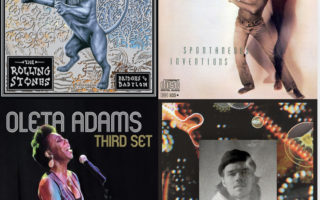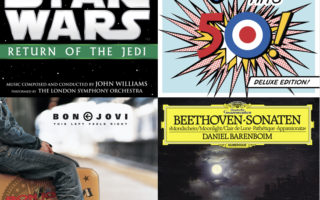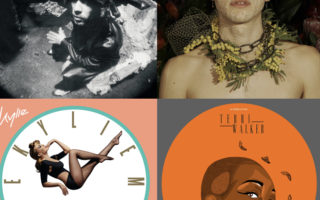You are a producer among many other things. How did it all begin for you?
I was a working musician from age 15 (But I did my first paying gig at 13). I studied and played guitar and double bass and loved Rock, Jazz and Classical in equal doses. I especially loved Elizabethan Music of 16th Century England.
I was raised in New York City and I had access to many professional musicians and singers. This led to a publishing contract. Short story, my publisher called me into his office and said he didn’t like my songs (long pause) but he loved my demos and offered me a job as house producer on the spot. That was in 1967 and that’s mainly what I’ve done ever since. From the same office I met Denny Cordell, who produced Procol Harum’s “A Whiter Shade of Pale”. I did a few hours work with him in New York and he offered me a job to fly to England and become his assistant. That was the second big life changer in just a couple of months.
Your career spans many years and many artists. What for you has been a major highlight?
Meeting David Bowie and Marc Bolan in the same month in 1967. They were already considered ‘used goods’ by then but I couldn’t believe my luck. I thought they were geniuses and I vowed to make their careers happen. They were still living at home and they were thrilled to come to my apartment and jam and sometimes sleep over. Apart from them I had so many great experiences with other artistes like Thin Lizzy, Mary Hopkin, Osibisa, The Strawbs, The Moody Blues, The Stranglers and recently with Perry Farrell and Damon Albarn (The Good, The Bad and The Queen).
What lesson have you learned about yourself in the last year?
Interesting question. I should never have dropped the ball on composing and performing. I’m in a touring band, Holy Holy, playing bass, and I’ve just put out and album called It’s A Selfie, my first since 1977. I’m devoting equal time to my own work and producing other artists.
Technology has changed drastically since you started, what’s your favourite analogue piece of music tech and digital piece?
I love old Universal Audio limiters, especially the 1176. It works on anything and the adjustments are very versatile. In the digital world I use plug-ins from Manley and Fairchild. They sound good! You know, if I had five real Fairchild’s in front of me they would all sound different, so analog is not a bastion of high standards. At least in the digital world every time I use plug-in emulations they are consistently perfect. I have a big list of both analog and digital gear in my studio. I have teamed up with Eventide to make my own Hansa Studios room emulator called T-Verb. It’s a big seller and I get fan mail about it all the time, even from classical engineers.
What current artists are getting you excited?
I’m not such a big fan of young artists. What do they know about life? I mean that in the nicest possible way. After two divorces and a hard hit liver is when you should start writing songs. The ‘youngest’ current artists who excite me are Kendrick Lamar and Mark Kozelek of Sun Kil Moon.
You were heavily involved with David Bowie, how did that come about?
I met him in 1967. His publisher asked me to have a listen to him with a view to produce his records. I heard his first album in the office. He was all over the place style-wise. His publisher agreed, he needed to be focused into something that would endear him to the youth market. David was 20 at this time. He was a stable mate of Cat Stevens and was soon dropped shortly after we met. David was waiting in the next room to meet me, I didn’t know this was going to happen. We instantly liked each other. We had so much in common, most underground artistes like The Fugs and Zappa. We liked Polanski films. We spent the rest of the day together and saw a late showing of ‘A Knife In The Water’ in a cinema in Chelsea, London, of course.
What’s one of your favourite moments of working with him?
There are too many to mention. Some reunions, like Heathen, after 14 years, then The Next Day, after 9 years and even Blackstar, were a cause for celebration. Incidentally we were both sober since Heathen, but after years of debauchery back in the day when it was a ‘well known fact’ that ‘cocaine was not addictive.’
You were also involved with the band Osibisa. What’s your favourite memory of working with them?
The Osibisa line up I worked with were just about the greatest musicians I had ever worked with at that time. But it was certainly a clash of cultures. They were the first Africans I worked with but I took them on because I was all too familiar with the Jazz/African Fusion bands from the 50s and 60s. Dizzy Gillespie played with African musicians and I think there was a famous African Michael Olatunji who played in Birdland frequently and whose recordings were heard on Symphony Sid’s jazz radio program. I was no stranger to the rhythms and I proved it over many times with Osibisa, but one or two of the members thought I was doing a good job despite the fact that I was white. I would call that a backhanded compliment. There was a bit of a cultural clash within the group as three musicians were of Caribbean and four were Africans. It wasn’t serious but there was obvious internal tension.
I thought by the end of the album we had enough of each other and would never work together again. I told their management my feelings. They told me that the band was asking about me and could I go to their upcoming show at Ronnie Scott’s Jazz club in London. So I went there and I got a big shout out from the stage. When the set was over, they came up to me and Teddy said, “What’s all this you don’t want to work with us?” As I was flustering to answer, they lifted me over their heads and marched me around the club. What could I say after that exhilaration but, “Okay, let’s do it!” I loved that band, I had the time of my life. It also qualified me to work with another great African, Angelique Kidjo. That was a blast, too, especially working with two of her percussionist friends from Benin.
Who are your favourite producers?
Phil Spector and George Martin. Because I know exactly what they did and they did it so well. I learned everything from them and arranging for strings and orchestra from Beethoven. Today’s teams baffle me. You can see about 20 people take the stage when one song wins. What’s all that about?
What do you like to do in your downtime?
Photography, since I was 8. I’ve done lots of publicity shots and a few album covers for my artists. I shot the front and back covers of “The Slider” although Marc Bolan gave Ringo the credit. It is a well known fact that Marc told some pretty tall tales back in the day, that was one of them. I confronted him.
I love Martial Arts and I’ve studied quite a few, but I only practice Chen Tai Chi now, the granddaddy of Tai Chi. It’s old school, it really keeps you fit if you practice daily. I do. My dear friend Lou Reed introduced me to this style and I practiced alongside him until he passed away. My teacher, Ren Guang-Yi, is a hardy soul from North China. He’s tough and he trains us hard.
You have travelled all over the world, what’s your favourite city?
Paris. It’s got everything I love, the culture, the architecture, the food, the colorful and proud, yet kind people. London is just slightly behind Paris.
You also play bass, who are your top three bass players?
In the timeline order I became aware of them: Charles Mingus, Paul McCartney, Esperanza Spalding (and a fourth place goes to Slam Stewart).
You got to arrange music for Paul McCartney and Wings what’s your favourite Beatles song?
We Can Work It Out. It reminds me of a Dickens Christmas. But there are so many others. Eleanor Rigby and Revolver in general had me packing my bags to move to England.
Of all the projects you’ve produced what are your top 3 favourites and why?
Top of the list would be Scary Monsters. Until that album we recorded very quickly, with a lot of swagger. There is nothing wrong with that as I am remixing The Man Who Sold The World. But with Scary Monsters we prefaced it by saying, “Let’s make this our Sgt Pepper.” In other words we were more careful, we took our time, we made huge productions and we didn’t turn it in until we were completely happy with it. Thankfully it was received very well and came out of the blue for Bowie fans. It was not what they expected (well, it never is really) and it was loved.
Of all the T. Rex records I’ve made my favorite is the last Tyrannosaurus Rex record, Unicorn. With the limited equipment and instruments we had at our disposal, that was our “Sgt Pepper” of the Tyrannosaurus Rex era. There are some great production tricks in there and the songs are divine. Lyrically Marc is at his very best. The imagery, still harkening towards Tolkien, takes you away into the fantasy world of wizards and elves that Marc loved so well. The electric guitar makes some very bold statements, and for the first time Marc trusts me enough to play piano on Cat Black (The Wizard’s Hat). I didn’t do a bad job considering I’m not a piano player.
Les Ritas Mitsouko, The No Comprendo. Catherine Ringer and Fred Chichin were forces to be reckoned with, so I found out. I wanted to work with them because they broke out of the mold of typical French Pop of the day. They sounded a little like Bowie, a little like Bolan and a lot of Avant Garde! I like being outside of my comfort zone and this album took me there. But the only quarrel we had was not about music. I used to take my lunch and dinner breaks on my own and I didn’t realize they took it as an insult. They came to my flat one night after work and said they were leaving to go back to Paris. Their reason was I didn’t take meals with them and that meant I didn’t like them. I told them in broken French and some English that I adored them and I just thought it was a good idea to take a break from each other. It took a good twenty minutes convincing them that I wanted to work with them and the very next day we started taking meals together. Their music was always in a good place. We had a kind of dance floor worldwide hit with “Andy”.
What are you working on at the moment?
I’m not permitted to talk about some projects, but I am working on my new album, slowly but surely.
What are you looking forward to most in the next 12 months?
Like the majority of Americans I am looking for a satisfactory presidential election for a better president than the present one. The government moves at the speed of magma. Social reform takes a generational amount of time. It’s the Poster Boy, or if possible, the Poster Girl who makes you feel better, but your three meals a day will be the same, TV will be the same, your personal life will be the same. I am watching and listening to less news on TV and Radio. News is always, always negative. Like any other TV show the News is in business to get more viewers and to get more money from the sponsors. What they show is designed to make you addictively angry.
So, in the next 12 months I will write more songs and pursue happiness.



